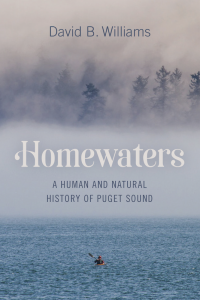HOW TO ORDER
1. Bookshop.org
2. Through me (includes signature.)
Published in Spring 2021 by the University of Washington Press. I was honored to receive a 4Culture Heritage Special Projects grant and Seattle Office of Arts and Culture CityArtists Project grant to work on this book in 2018.
Book Clubs – I support everything about book clubs: literature, community, gossip, pretending-to-read-while-sipping-wine, and the grassroots chance to connect with readers. If your book group is reading Homewaters, and we can figure out a time that works for you and for me, then I will be happy to join your group via Zoom for half an hour or so. For inquiries, please reach me via email from my contact page.
“Many in our group commented that they gained a better overview from you in 60 minutes than they learned in a lifetime of spending time on the land and on the water….Essentially, you are impressive with your knowledge, joyful (even playful) in your presentation, patiently insightful with questions, and, as always, exceedingly generous with your time and wisdom.”
Sound Waters University Steering Committee
An outstanding review in Post Alley by Dan Chasan.
Want to take a fun quiz about Puget Sound. Here’s one I created.
Upcoming talks: (See my Walk/Talks page for information on events.)
Possessing the features of both a fjord and an estuary, Puget Sound is ecologically unique with its great depth, great diversity, and tremendous productivity. It is home for clams that live for 150 years, more than 250 species of fish, great, teeming schools of herring, and underwater forests as complex as any terrestrial ecosystem. It has tideflats that have provided a bounty of food for thousands of years, intertidal zones that may have the longest continuous use by humans of any regional habitat, and species such as salmon and orca that are as integral to the human inhabitants as to the more than human inhabitants. But Puget Sound ecosystems have also suffered from human behavior including shoreline armoring, overfishing, toxin and pollutant runoff, habitat destruction, and climate change-induced chemical and temperature changes.
These impacts result from two centuries of post-settlement mindset, which held that Puget Sound and its surroundings were an abundant resource to be exploited. In the past couple of decades, however, we have entered an era of unprecedented understanding of the nature of this beautiful place. Numerous agencies and scientists are working to regulate fishing, control pollutants, and manage the land and water. Puget Sound may not be as healthy as when George Vancouver became the first European to visit the waterway in 1792, but it is now viewed more as a prized ecosystem than a utilitarian one and in many ways exemplifies our modern connection to the natural world.
My goal is to illuminate relationships between people and environment, past and present, and natural landscapes and altered ones. How does this place we call Puget Sound impact those who live here? How do our actions affect Puget Sound and its inhabitants? Each chapter weaves personal observations, field time, discussions with experts, and examination of historical and recent documents to tell stories that help answer these questions. Homewaters: A Human and Natural History of Puget Sound is my interpretation of a unique set of environmental and historical conditions and opportunities; it is just one of many stories that could be written.
Author’s Note
Chapter 1 – Birth of a Name
Chapter 2 – Birth of a Place
Chapter 3 – Peopling Puget Sound
Chapter 4 – Defending the Sound
Chapter 5 – The Maritime Highway
Chapter 6 – Seaweeds in the Sound (Kelp)
Chapter 7 – The Silver Wave (Herring)
Chapter 8 – Old Fish and New Laws (Rockfish)
Chapter 9 – The Table is Set (Shellfish)
Chapter 10 – Homebodies (Salmon and Orca)
Here are a few articles I have written that relate to the book.
- Geoducks – Human history – Encylopedia of Puget Sound
Herring – Human History – Encyclopedia of Puget Sound
The Strait of Juan de Fuca – History – HistoryLink.org
Vancouver Names Puget’s Sound – History – HistoryLink.org
Hudson’s Bay Company Builds Fort Nisqually – History – HistoryLink.org
SS Beaver, 1st Steamer in Puget Sound – History – Historylink.org - Modern Human Attempts at Using Kelp – History – Historylink.org
A fun interview about the book on Crosscut.
An interview with Steve Scher for In the Moment from Town Hall.
An interview with Feliks Banel for My Northwest on KIRO.
An interview with Patricia Murphy for Seattle Now on KUOW.
An excerpt from Homewaters in the Seattle Times.
